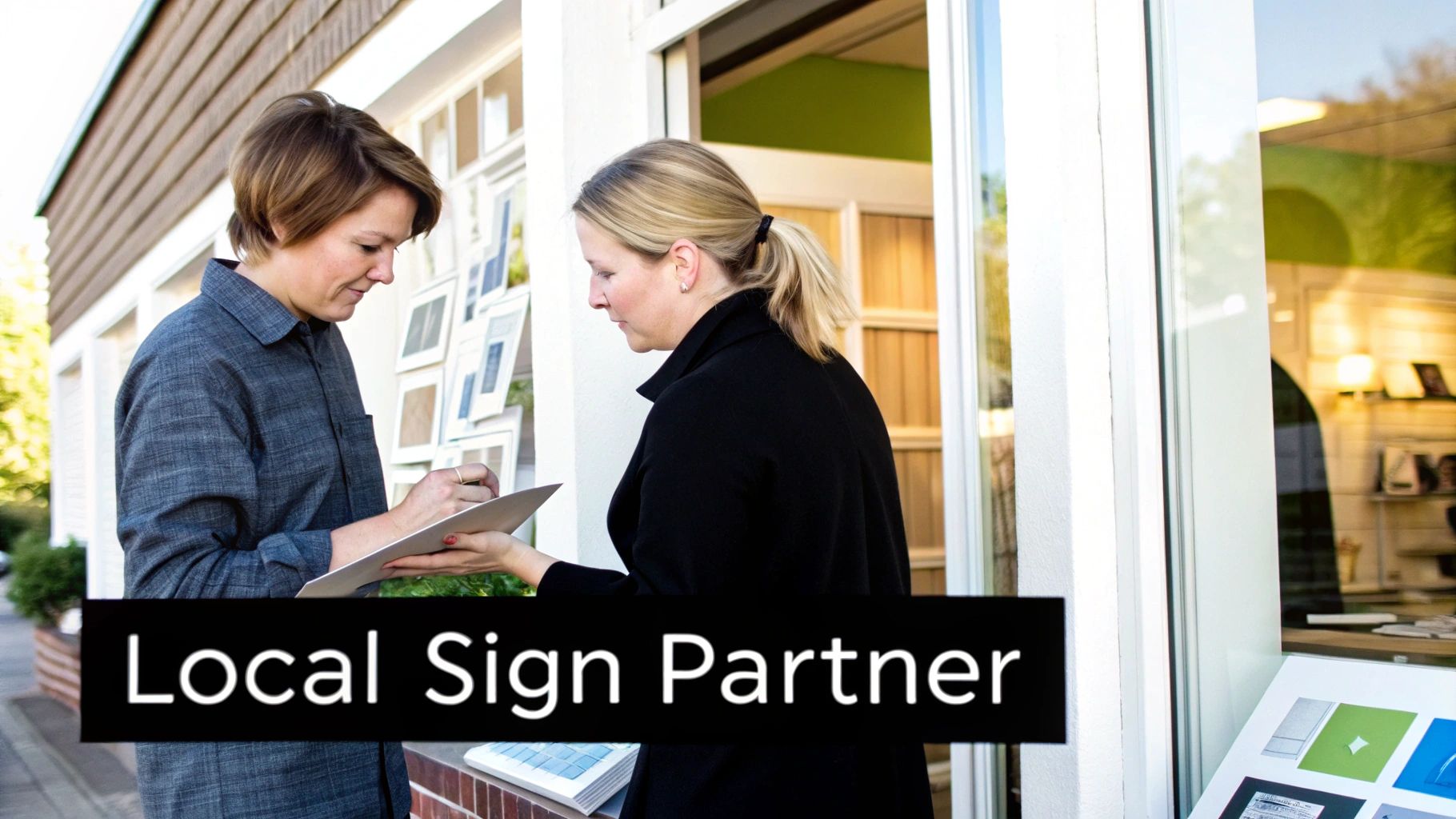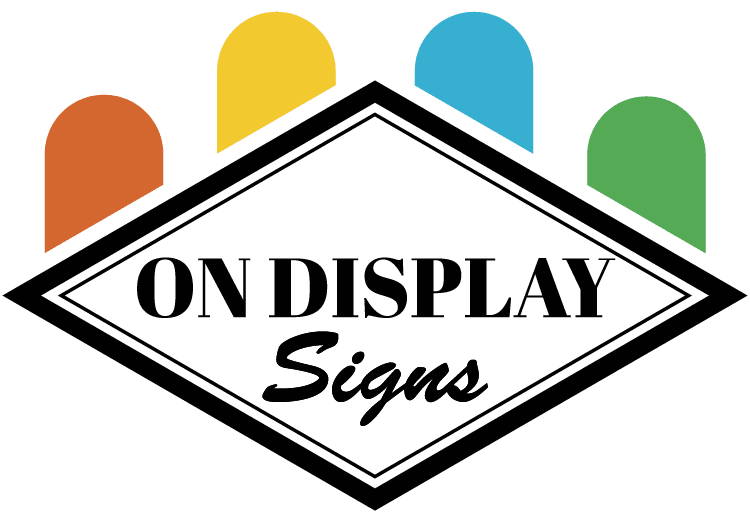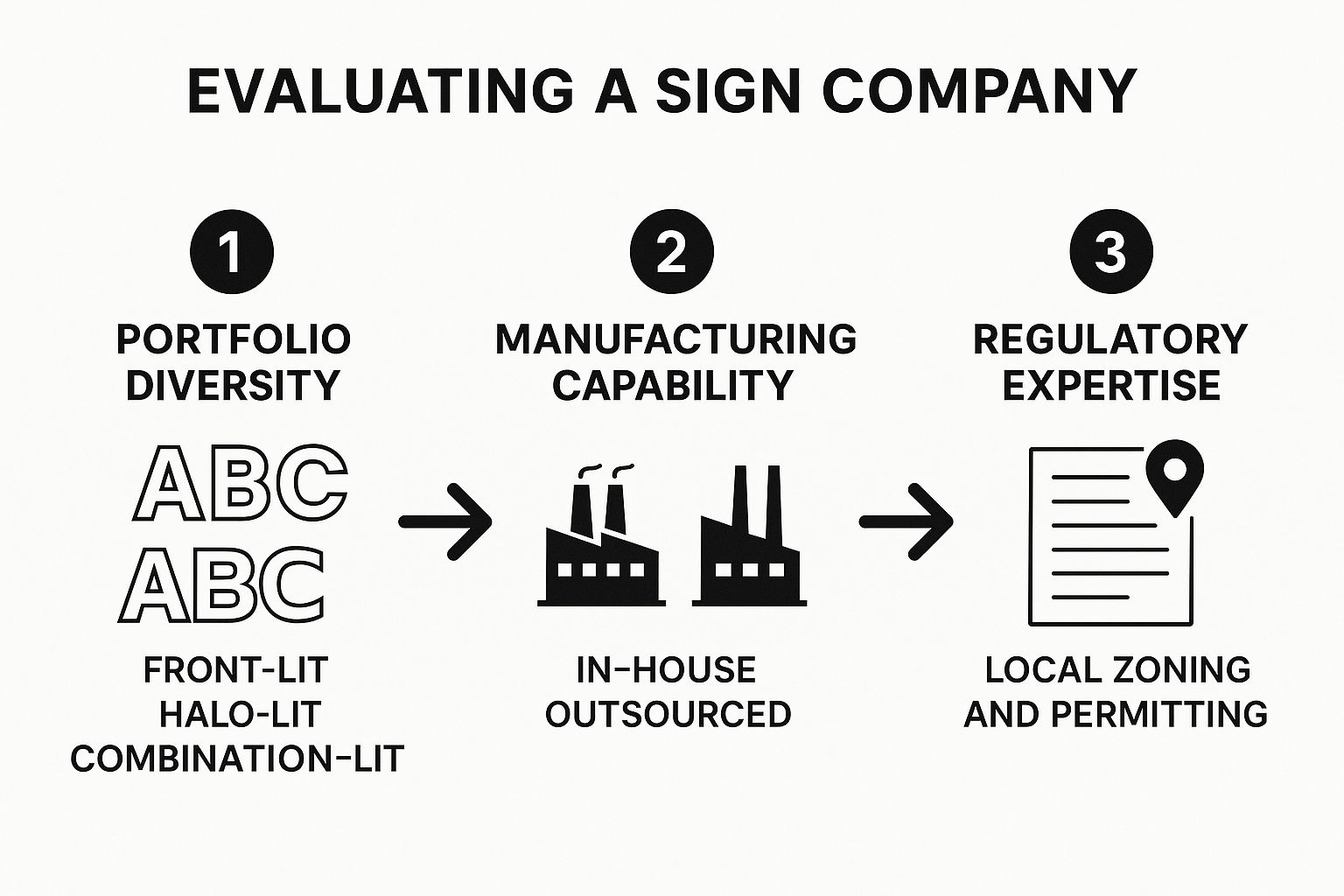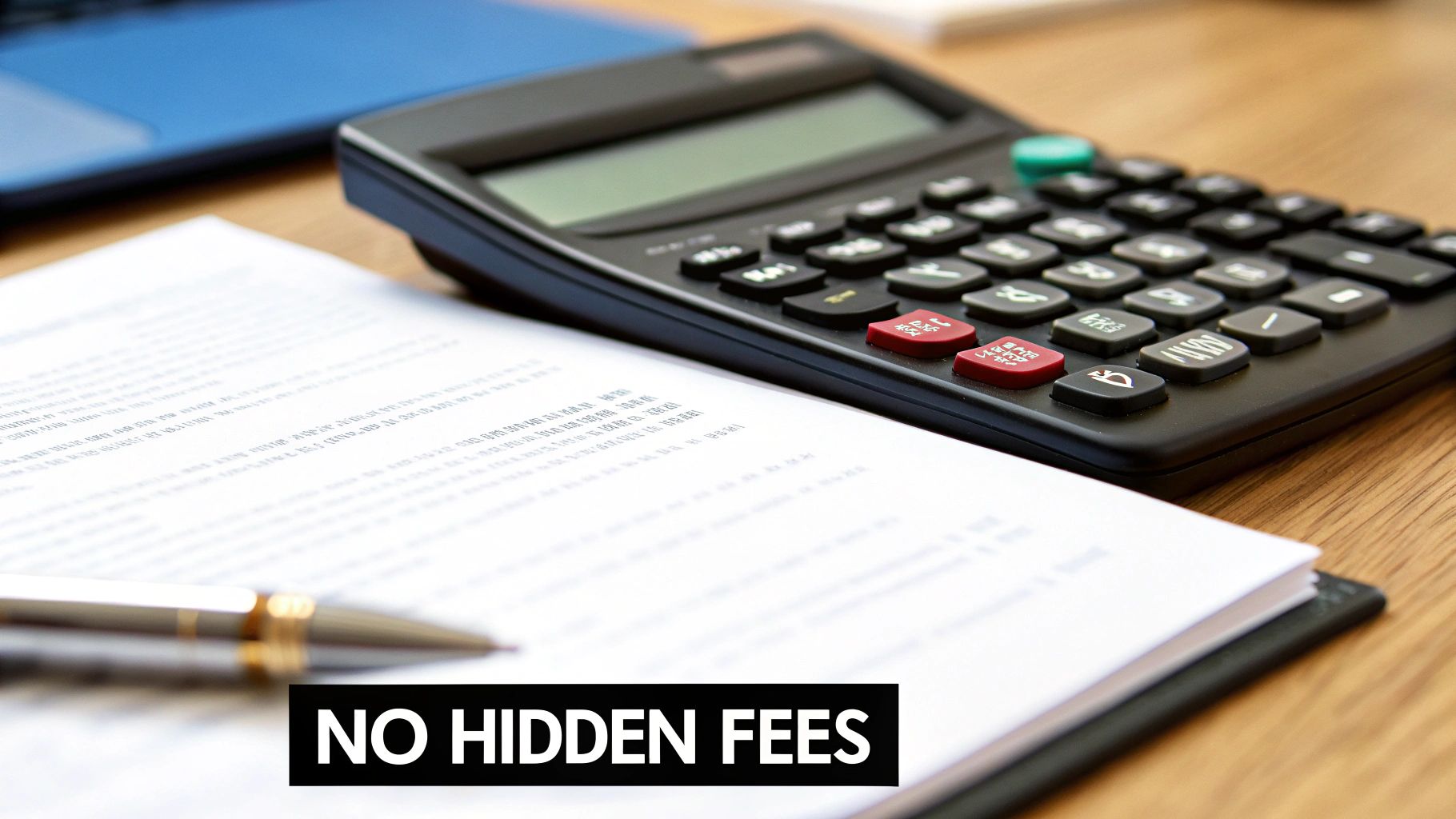Typing "channel letter sign companies near me" into a search bar can leave you staring at a wall of options. It's tempting to just pick one and get started, but choosing the right sign partner is one of the most important decisions you'll make for your storefront. A great sign company isn't just a vendor; they become a genuine partner in building your brand's physical presence and long-term success.
Think of this process less like a simple purchase and more like a strategic investment in your business's visibility and credibility.
Finding the Right Local Sign Partner

Choosing a local sign expert is about so much more than just finding someone to bolt some letters onto your building. You're looking for a team that gets your vision, delivers rock-solid craftsmanship, and truly understands the local landscape—from the weather to the city hall permitting desk.
The right partner becomes an extension of your own team, making sure your sign not only looks fantastic but also sails through all municipal requirements without a hitch. They bring a lot more to the table than just fabrication skills.
Why Local Expertise Matters
- Navigating Local Red Tape: Every town has its own maze of zoning laws and permit rules. A local company has been through it all before. They know the inspectors, the paperwork, and the unwritten rules, which saves you from costly delays and last-minute redesigns. For example, a local pro will know that your town requires a specific font for signs in the historic district or that illuminated signs must be dimmed after 10 PM. This insight prevents a failed inspection.
- Understanding the Environment: Is your storefront blasted by the afternoon sun? Does your city have a historic district with strict aesthetic rules? Local pros know the climate, the architectural styles, and what it takes for a sign to pop in your specific community. This insight is gold when it comes to choosing the right materials and design.
- Accessibility and Accountability: When your sign maker is just down the road, communication is instant and site visits are simple. There’s a different level of accountability when you can actually drop by the shop. It builds a much stronger, more personal working relationship.
Today, most of us start this search online. That's why understanding effective digital marketing for local businesses can help you spot the truly established, reputable companies from the rest.
Ultimately, this guide is here to give you a clear, actionable game plan. It’s designed to help you move past a generic search and confidently identify, vet, and hire a local company that will make your brand shine for years to come.
What to Look For in a Sign Company
Once you have a shortlist of local channel letter sign companies, it’s time to dig deeper. Just picking up the phone without a game plan can leave you with a pile of mismatched quotes and a lot of confusion. Think of it this way: you need a consistent scorecard to judge each contender fairly.
A great sign is a long-term investment in your brand's visibility, and the company you hire will determine its quality, durability, and whether it even gets approved by the city. You're not just buying a product; you're hiring a critical partner.
The U.S. signage industry is massive. There are roughly 5,837 sign companies across the country, with over 77,648 workers powering a market projected to hit $16.7 billion by 2025. This tells you there are plenty of options out there, but finding the true experts—the ones who can deliver a stunning channel letter sign that lasts—is what really matters.
Assess Their Portfolio and Specialization
A sign company’s portfolio is their resume, and you need to read between the lines. Don’t get distracted by a few flashy photos; look for proof of their expertise and versatility, especially with channel letters.
A solid portfolio will showcase a healthy mix of projects, proving they can handle whatever you throw at them. Specifically, look for examples of:
- Front-Lit Channel Letters: These are the industry standard for a reason—bright, bold, and impossible to miss.
- Halo-Lit (or Reverse-Lit) Signs: This style creates an elegant glow or "halo" effect around the letters, perfect for a more sophisticated, high-end feel.
- Combination-Lit Signs: The best of both worlds, blending front illumination with a back-lit glow for maximum visual punch.
If their gallery is thin or only shows basic, non-illuminated signs, they probably don't have the specialized skills needed for complex channel letter fabrication. For a better sense of what's possible, check out our guide on the different types of outdoor business signs.
This infographic breaks down the core areas you should focus on during your evaluation.
Use this as a quick visual checklist to make sure you’re covering all your bases—from their past work to their production capabilities and local code knowledge.
Key Vetting Criteria for Local Sign Companies
To keep your evaluation process organized, use this checklist to compare companies head-to-head. It helps ensure you’re asking the right questions and focusing on what truly matters for a successful project.
| Evaluation Criteria | What to Look For | Why It Matters |
|---|---|---|
| Portfolio Diversity | Examples of front-lit, halo-lit, and combination-lit channel letters. A variety of sizes, fonts, and complexities. | Shows they have the technical skill and experience to handle your specific design, not just simple projects. |
| In-House Fabrication | A company that manufactures its own signs versus outsourcing. Ask if you can see their shop. | In-house control means better quality, faster turnarounds, and direct accountability. Outsourcing adds delays and risks. |
| Local Permit Expertise | Deep knowledge of your specific city's zoning codes, sign ordinances, and permitting process. | This is non-negotiable. It saves you from costly fines, project delays, and the nightmare of having to take a sign down. |
| Material Quality | Use of high-quality materials like durable aluminum, high-impact acrylics, and reputable LED modules (e.g., UL-listed). | The materials determine your sign's lifespan, weather resistance, and brightness. Cheap components fail quickly. |
| Client Testimonials | Genuine reviews from local businesses you might recognize. Look for comments on process, communication, and durability. | Provides social proof and insight into the actual client experience, from the first call to the final installation. |
This table serves as a simple but effective tool to ensure you make an informed decision based on concrete factors, not just a sales pitch.
Evaluate Manufacturing and Regulatory Knowledge
Looking at past projects is one thing, but understanding how they create those signs is another. The first question you should ask is whether they build their signs in-house or outsource the work.
A company with its own fabrication shop has complete control over quality, materials, and the project timeline. It means they can build prototypes, make on-the-fly adjustments, and ensure every detail is perfect. Outsourcing often introduces communication gaps, delays, and a lack of direct oversight.
Just as critical is their grasp of local sign codes. A top-tier sign partner lives and breathes your city's zoning ordinances and permit requirements. They should be able to tell you immediately about any potential roadblocks—like restrictions on size, height, brightness, or placement for your specific location.
This expertise is the difference between a smooth project and a bureaucratic nightmare filled with delays, redesigns, and potential fines.
Vetting Your Shortlist of Sign Companies
Alright, you've got a handful of promising local sign companies on your radar. Now it’s time to roll up your sleeves and go deeper than a quick glance at their website. This is where you separate the real pros from the rest.
Think of yourself as an investigator. You're looking for hard evidence of their craftsmanship and reliability, not just slick marketing. This part of the process is all about validating their claims so you can confidently compare each company side-by-side.
Dive Into Their Portfolio and Online Reviews
A company's online footprint tells a story if you know how to read it. Start with their portfolio, but don't just scroll through the pretty pictures. Look closer.
Are the letters spaced perfectly? Is the branding color-correct? A deep portfolio that showcases different channel letter styles—like front-lit versus halo-lit—is a great sign of experience. It shows they're not a one-trick pony.
Next, hit up review sites like Google and Yelp. A few bad reviews happen, but you're looking for patterns. Consistent complaints about blown deadlines, shoddy installation, or signs failing after a year are huge red flags. On the flip side, if you see repeated praise for a smooth process and a sign that lasts, that's a company that cares.
A portfolio shows you what a company can do, but reviews tell you what they actually do. And pay close attention to how they handle negative feedback—a professional response to criticism says a lot about their character.
See Their Work in the Wild
Digital photos can be forgiving. There's no substitute for seeing a sign company's work in person. Don't hesitate to ask for a list of local installations; any reputable shop will be proud to share one.
Carve out an afternoon and go for a drive. This little field trip will give you insights you simply can't get online.
- Zoom in on the details: Get close enough to see the seams and the trim cap (the plastic edge on the letters). Does it look tight and clean, or can you see sloppy wiring and gaps?
- Judge its durability: How is the sign holding up against the elements? Look for fading, cracks, or dead spots in the lighting. A sign that looks worn out after just a year or two is a clear indicator of cheap materials.
- Do a day-and-night comparison: Try to visit one or two signs after the sun goes down. Is the lighting bright and even? Or are there noticeable dim spots and an inconsistent glow?
This is your best chance to confirm the quality of local channel letter sign companies near me.
Arm Yourself With the Right Questions
When you’re finally ready to pick up the phone, have your questions prepared. This isn’t just a casual chat; it’s an interview. Asking each company the same questions ensures you can make a true apples-to-apples comparison later.
Your mission is to understand their entire process, from design to the day they flip the switch.
Here are a few questions I always recommend asking:
- Who will be my single point of contact? Having a dedicated project manager is a game-changer for clear communication.
- What’s your typical timeline for a sign like mine, from design approval to installation? Their answer reveals a lot about their workload and efficiency.
- How do you handle the city permitting process? The best companies manage all that red tape for you. Trust me, it’s a massive headache you don't want.
- What brands of LEDs and power supplies do you use, and what are their warranties? This is a technical question, but it’s a fantastic way to test their expertise and commitment to quality parts.
Asking direct, process-focused questions like these will quickly tell you who knows their stuff.
How to Decode Quotes and Avoid Hidden Costs
Once you've talked with a few local sign companies, the proposals will start rolling in. This is where you have to put your detective hat on because no two quotes are alike. One might be a single page with a bold number at the bottom, while another is a detailed, multi-page document that accounts for every last component.
Your job is to get past the different formats and make a true apples-to-apples comparison. Trust me on this one: the cheapest quote is almost never the best value. A suspiciously low price is often a dead giveaway for corner-cutting on materials, a rushed installation, or—worst of all—a laundry list of "surprise" fees that conveniently appear on the final invoice.
Breaking Down the Quote
Any professional, trustworthy sign company will provide a transparent, itemized quote. If a quote is vague or missing key details, that’s a major red flag. You need to insist on a complete breakdown so you understand exactly where your money is going and can spot the major differences between bids.
A solid quote should clearly separate these costs:
- Design & Engineering Fees: This covers the creative process and the technical drawings needed to get permits and actually build the sign.
- Permit Acquisition Costs: Look for two parts here: the city's actual permit fee and a service charge for the sign company handling the entire headache-inducing process for you.
- Fabrication Costs: This is the core price for building the sign itself—all the aluminum, acrylic, vinyl, and skilled labor involved.
- Lighting Components: The proposal should specify the exact brand and type of LEDs and power supplies. Top-tier, UL-listed components cost more upfront but are absolutely essential for a sign that lasts.
- Installation & Electrical Work: This line item covers the crew's time to mount the sign securely and perform the final electrical hookup.
Never, ever accept a quote that just lumps everything into one "total cost." A lack of transparency at the proposal stage almost always leads to a lack of accountability when the work is underway.
Uncovering Potential Hidden Costs
The real difference between a smooth project and a nightmare often lies in the costs that aren't on that initial quote. Before you sign any contract, you have to ask some pointed questions to make sure the price is truly all-inclusive. I’ve seen too many business owners get their budgets wrecked by unexpected charges.
For instance, a company might "forget" to include the fee for a mandatory site survey, which is needed to verify measurements and check electrical access. Another classic surprise is the need for special equipment. If your sign needs a crane for a high-up installation, that can add hundreds, if not thousands, to the final bill.
Protect your budget by asking these questions directly:
- Does this price cover all the required electrical work, or will I have to hire my own electrician separately?
- Are the costs for site surveys and any necessary engineering stamps included?
- What’s the plan if you discover unforeseen structural problems during the installation? Who covers that cost?
- Is freight and delivery of the sign to my location included in this price?
Asking these questions forces the sign company to be upfront about the total investment. It’s the best way to ensure the price you agree on is the price you actually pay, saving you from budget-busting surprises down the line.
Why Quality Signage Is a Powerful Investment
When you start looking at quotes from different sign companies, it's natural to fixate on the bottom-line price. But here's the thing: a well-made channel letter sign isn't just another business expense. It's a genuine asset, one that works for you 24/7 to deliver a real return on your investment.
Think of your sign as your best salesperson. It never sleeps, tirelessly attracting customers, building brand recognition, and cementing your reputation in the neighborhood. This is about so much more than just putting your name on the building—it's about making a killer first impression that gets people in the door.
Connecting Upfront Cost to Long-Term Value
I've seen it happen time and time again: trying to save a few bucks upfront by choosing the cheapest option almost always costs more in the long run. A "bargain" sign is often built with subpar materials—lower-grade aluminum that rusts, acrylic faces that turn a sickly yellow in the sun, or shoddy lighting that starts flickering in a year.
Before you know it, you're dealing with a string of expensive headaches:
- Frequent Maintenance Calls: Dimly lit letters or blinking LEDs just make your business look unprofessional and neglected.
- Costly Repairs: You’ll quickly burn through any initial savings when you have to start replacing failing power supplies or cracked letter faces.
- A Full-Blown Replacement: A poorly constructed sign might only last a couple of years before it’s beyond repair, forcing you to start the whole frustrating process from scratch.
When you invest in quality materials and expert installation from a reputable sign company, you get a sign built to last. It will hold up to the weather, keep its vibrant look, and shine brightly for years with minimal fuss. That durability is where you find your real ROI.
A professional sign communicates that you are an established, credible business built on quality. It's a visual promise to your customers before they even walk through the door.
The Growing Importance of Visual Branding
The numbers don't lie. The signage industry is booming, which tells you just how critical it is for a business to be seen. In 2023, the global signage market was valued at around $26 billion, and it's expected to jump to nearly $36 billion by 2030. This isn't just a trend; it's a clear signal that business owners everywhere understand that great signage drives brand presence and revenue.
Of course, your sign is just one part of your brand's identity. To really stand out, you need to think about the bigger picture. It's helpful to explore all the branding items to consider when starting a new business to create a cohesive look.
Ultimately, partnering with an experienced sign company is an investment in a durable marketing tool that cements your place in the community. You can explore a variety of types of commercial signs to find the perfect fit for your brand's look and long-term goals.
Making Your Final Choice and Launching the Project
You’ve done the legwork—the research, the vetting, the quote comparisons. Now it’s time to make the call and pick your partner from the handful of local channel letter sign companies you've shortlisted.
Ultimately, this decision comes down to confidence. Who made you feel most at ease with their expertise? Who was the clearest communicator? Trust your gut and go with the company that gave you the strongest sense of transparency and professionalism.
Once you’ve made your choice, the project officially kicks off with the contract. Whatever you do, don't rush this part. It’s crucial to meticulously review every single detail in the scope of work and the final agreement before you sign anything.
Finalizing the Agreement
Think of the contract as your project's blueprint and your number one form of protection. It needs to explicitly outline every single critical element you’ve discussed up to this point.
- Timelines: Make sure there are firm dates for design approval, when fabrication will be complete, and the final installation day.
- Deliverables: The contract must spell out the exact materials, dimensions, and lighting components (e.g., UL-listed LEDs). No ambiguities.
- Payment Terms: Get a clear breakdown of the deposit amount, any progress payments, and the final balance due upon completion and your approval.
A detailed contract isn't about a lack of trust; it's about creating a shared understanding. This single document prevents miscommunication and ensures both you and the sign company are perfectly aligned on the project goals and expectations.
Common Questions We Hear All the Time
Even after you've done your homework, a few questions always seem to pop up when you're zeroing in on the right sign partner. Let’s tackle some of the most common ones we hear from business owners who are starting their search.
How Long Does This Whole Process Actually Take?
From our first chat to the day your sign is shining bright, a typical channel letter project takes about four to twelve weeks. That might seem like a wide range, but it really depends on a few key variables.
- Design Complexity: A clean, simple font and logo will move through production much faster than a sign with intricate details or custom-mixed colors.
- The Permit Gauntlet: This is, without a doubt, the biggest wildcard. Some city offices can turn a permit around in a week. Others? You could be waiting a month or more. An experienced local company knows the ropes and can often avoid unnecessary delays.
- Their Current Workload: Every reputable shop has a production queue. How busy they are when you sign on will naturally affect your spot in line.
What’s the Single Biggest Mistake I Can Make?
Choosing a sign company just because they gave you the rock-bottom price. It’s a trap we see business owners fall into all the time, and it’s almost always a costly one.
That suspiciously cheap quote is a red flag. It often means they're cutting corners with lower-grade aluminum, shoddy wiring, or cheap LEDs that will start to flicker and fail in just a year or two.
Prioritizing quality upfront saves a massive amount of money and headaches on future repairs and replacements. A well-built sign is a one-time investment; a cheap one is an ongoing expense.
Why Is Everyone So Obsessed with Channel Letters?
It really boils down to two things: visibility and professionalism. In a crowded marketplace, you have to stand out, and channel letters get the job done. They are three-dimensional, internally lit, and built from durable aluminum and acrylic.
This gives your business a bold, high-end look that works 24/7 to catch the eye. They’ve become the gold standard for a reason—in competitive areas, they give you the presence you need to get noticed.
Is My Main Sign the Only One I Need to Worry About?
Absolutely not. Your big, beautiful channel letter sign is your star player, but don't forget about the rest of the team. You’re also responsible for mandatory signs that keep your customers and employees safe.
For example, you have to meet strict local and federal emergency exit signage requirements. A true full-service sign partner can handle your entire signage package, ensuring you’re fully compliant with the law while keeping your branding consistent across the entire property.
Ready to create a sign that elevates your brand and drives real results? The experts at On Display Signs, Inc. are here to guide you through every step, from design and permitting to flawless installation. https://www.ondisplaysigns.com







